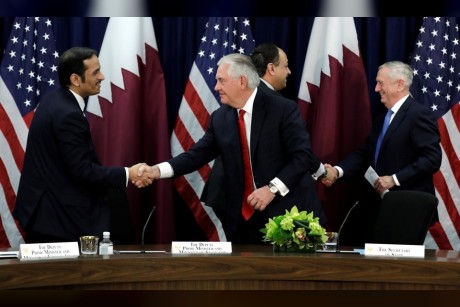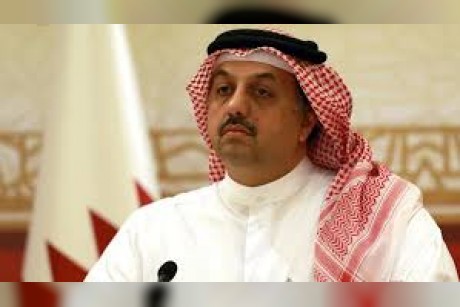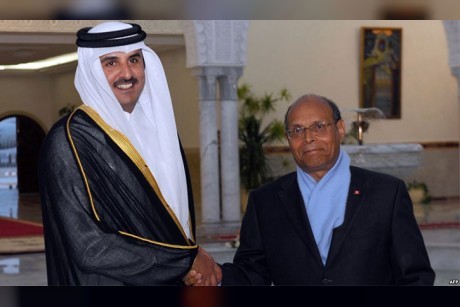Before Turkey airlifted in infantry to help tiny Qatar defend against a potential invasion or against an internal coup, the Gulf stood on edge. Now, more than six months later, things are looking rosy for Doha.
Foreign Minister Mohammed bin Abdulrahman Al Thani and Defense Minister Mohammed al-Attiyah were in Washington at the end of January signing agreements and meeting with US Secretary of State Rex Tillerson and Secretary of Defense Jim Mattis as part of a US-Qatar Strategic Dialogue confab.
Al Attiyah told reporters the emirate will expand Al Udeid Air base, home to 10,000 troops. Al-Thani addressed an American Enterprise Institute special event on ‘Changing Dynamics in the Gulf.’ Qatar’s foreign ministry celebrated the victory-lap in the US with #QatarUSA tweets.
Turkey hinted it could deploy further forces to Doha. The only silver lining for critics of Qatar’s, is that the US announced it was labeling Hamas leader Ismail Haniyeh a Specially Designated Global Terrorist. Hamas leaders have frequently visited and resided in Qatar.
For observers of the Gulf, especially those who have criticized Qatar’s track record, the emirate’s success in Washington and in pushing its narrative in the media of being the “victim,” has been surprising.
Qatar, with a native population of only 260,000 and several million foreign workers, has a GDP half the size of Israel's. In the Gulf it has built up an impressive reputation, hosting a massive US military base, growing Al Jazeera as a media brand and hosting international universities and cultural events.
Unlike other GCC countries such as Bahrain, Kuwait and the UAE, it sought to have its own foreign policy. It supported the Muslim Brotherhood in Egypt, and has flirted with Islamist extremists for years, being accused of letting terrorists and terror finance flow through Doha.
The story of how Qatar surmounted the 2017 crises and became the toast of Washington again is filled with innuendo, infighting in the US government and a major PR campaign the emirate launched using lobbying and PR firms in the US. Some of Qatar’s efforts are public because firms it works with had to file with the US Department of Justice Foreign Agent Registration Act (FARA).
Between June and July 2017, Qatar retained the services of eight firms in the US, and then retained nine more later in the year. According to the filed contracts, Doha agreed to pay between 50,000 and $500,000 a month to each.
Total obligations if it kept the agreements for a year add up to $22 million. Qatar was up against similar lobbying by the UAE and Saudi Arabia, both of which also retain dozens of firms and pay millions for their services in Washington.
On June 7, Ahmed Y. Al-Rumaihi from the Qatari embassy signed an agreement with the Ashcroft Law Firm to engage John D. Ashcroft, former US Attorney General, to “enlist the support and expertise of former key government leaders,” to respond to the crises. According to the FARA filing the advise would include former officials from the “intelligence community,” the FBI, the Department of Treasury and Department of Homeland Security.
In essence Qatar was enlisting the help of a network of former officials and their friends in the media and government. A June 30th letter from another firm to the Embassy of Qatar spelled out how it would advocate on behalf of Doha; “liaison with Executive Branch officials and Members of Congress.” Two former members of Congress would go to bat for Qatar on the hill.
Qatar’s PR firms also printed up adds claiming “Qatar is America’s strongest ally in fighting ISIS,” and that the US and Qatar have “shared values.” Secretary of State Rex Tillerson’s pro-Qatar stance was highlighted in the leaflets.
The battle culminated in a September 18-28 campaign to “lift the blockade” claiming it was “illegal” and “Qatar will prevail.” They built a website, lifttheblockade.com and bought a full page print add in The New York Times, Washington Post, Wall Street Journal, Financial Times, Google, Snapchat, mobile billboards and on Fox and CNN. The adds also specifically targeted the UN HQ, the Financial District in NY, Times Square and JFK.
According to one insider who has observed the Doha campaign for “hearts and minds of Washington,” the Qataris found allies in Tillerson and Defense Secretary Jim Mattis. Both cabinet members were surprised by the Saudi decision to cut relations in June. “They were troubled with the timing and felt it could distract in the fight against Iran and extremism,” the source says.
The sense among many is that Qatar was scared in June and July and felt it had its back up against the wall, and rushed to sign an agreement to combat terror financing on July 10th. The agreement was not made public.
Neubauer, the Gulf expert, says that the debates we see in media today are just part of the story. This was an attempt to “wage economic warfare,” against Qatar and “the narrative and consensus has shifted in Washington and this is a manufactured and reckless crises,” he argued. He thinks Washington policy circles now think Riyadh exploited grievances with Doha to undermine US interests and objectives.”
Jonathan Schanzer, senior vice-president for research at the Foundation for Defense of Democracies, said Qatar has been making promises to change and crack down on terror for years.
He described Qatar’s offensive in Washington as going down to the “micro level” which means it seeks to appeal to think tanks and organizations and different influential groups in the US. “It seems to me very premature to come out and defend the Qataris in what appears to be their reform process.”
Central to the PR battle of whether Qatar has changed is its position on Hamas. Qatar sought to influence members of pro-Israel organizations, claiming it had a new face.
Schanzer stressed it’s too early to know whether there is real change afoot.
“Qatar must prove they are turning a new leaf,” he said.
The Qataris have claimed the US never asked them to expel Hamas. According to leaked 2008 US government cables, diplomats concluded “the intelligence on Qatar’s official support for Hamas is inconclusive.” But the previous emir, Hamad bin Khalifa, told Al Jazeera in September 2011 that “even if we support Hamas we will be supporting a legitimate government,” if Hamas joined a Palestinian unity government.
Other leaked documents claim that in 2011 there was pressure on Qatar to take in Hamas members from Damascus and Qatar agreed only to take “political” members.
On November 14, one of Qatar’s firms in Washington sent a letter to members of the House Foreign Relations Committee attaching a letter from Israeli Brig. General Shimon Shapira. claiming “Qatar has not delivered weapons to Hamas.” Shapira has been an advisor to Israeli Prime Minister Benjamin Netanyahu.
Qatar has broken its isolation not only in the region through outreach to Iran and Turkey but also in Washington, illustrating how it put together a successful strategy. This involved mobilizing multiple layers within the US; from media to government and various lobbies to put across a narrative that Saudi Arabia was in the wrong.
Critical voices say Qatar needs to recognize there is a real cost to bad conduct. Has Doha seen the cost? One of the firms they retained was engaged to verify and evaluate “strengthening Qatar’s anti-money laundering and counterterrorism financing compliance programs.” Cost: $165,000. In the high stakes world Qatar plays in, that’s not much.



